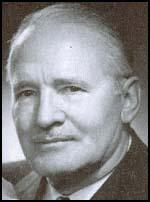Benjamin de Forest Bayly

Benjamin de Forest Bayly, the son of Benjamin Moore and Alice de Forest Bayly, was born in Ontario on 20th June, 1903. He grew up in Moose Jaw, Saskatchewan, where his father worked as a medical officer.
Bayley graduated from law school at the University of Saskatchewan in 1923. He disliked law and decided to study the University of Toronto in electrical engineering. In his third year he was offered a teaching post in the university.
In 1938 he became a consultant to the National Electric Corporation (NEC) and on the outbreak of the Second World War he developed antennas to be placed on small bombers. In 1941 he was recruited by William Stephenson, the head of the British Security Coordination (BSC) as Deputy Director of Communication. He later recalled that they wanted "a man who understood something about commercial communications, and who would have enough security clearance to buy top secret radio material. The point is that the English were, at the moment, developing all sorts of secret radio. Putting in the spies in Europe, and that sort of thing. They didn't want to divulge what they were buying through normal commercial channels."
Bayley eventually moved to England where he worked with Alan Turing: "Turing was one of the great minds of the century.... He stuttered, but apart from that, Bayly thought there were also times when his brain seemed to be working so fast, he couldn't speak at all. Turing would try to talk, but only strange clicking sounds came out.... After the war the best thing that Turing could get was an assistant professorship at a third-rate, Manchester or something, engineering school. Everybody says he committed suicide because he was gay, which as far as I'm concerned, is just so much nonsense. He committed suicide because you couldn't go from being one of the most important people in England to just nothing at all."
After the war Bayley returned to the University of Toronto. He later formed Bayley Engineeringand worked on numerous electrical and mechanical devices, many of them top-secret. In 1955 he was elected the first mayor of Ajax, Ontario. He eventually sold the company and retired to California.
Primary Sources
(1) Bill Macdonald, The True Intrepid: Sir William Stephenson and the Unknown Agents (2001)
There was a lot of false information floating around that disguised Gouzenko's whereabouts. On one occasion Bayly and his wife heard on the radio, as they were driving from Oshawa to Camp X, reports that Gouzenko was likely staying somewhere in the Laurentians, north of Montreal. "Everybody was heading there. And here's Gouzenko sitting on a deck chair outside the house, just as we drove up. I thought that was quite amusing. Poor old Gouzenko. He had no more brains than a peanut."
"How did he write that book then?"
"I think his wife did it. She was quite a girl. It was his wife who advised him what to do. The military attaché at the Soviet embassy got Gouzenko to decode one of his messages because he didn't feel like doing it himself. When Gouzenko decoded it he saw it was instructions for him to be sent back to the Soviet Union, because he wasn't trusted. "He'd be bumped off on landing," Bayly said, "the way the Russians were running things in those days." Bayly says Gouzenko then asked his wife for advice.
"What do I do now?" And so she told him, "Go into the vault and steal every secret thing you can put your hands on, and change the combination on the vault and lock the door. It'll take six weeks for the Russians to send somebody over to chisel the door of the safe open to find out you've taken all these things. Turn yourself over to the Canadians." So at the time the Canadian Prime Minister, King, said he wasn't going to be mixed up in that kind of Russian politics, and gave strict orders to the RCMP.
Norman Robertson, who was the Secretary of External Affairs, told this story to Bill, and what King was doing with this one. So Bill Stephenson headed up to Ottawa, borrowed my Buick from Camp X, and drove it up to Ottawa and arrested Gouzenko, military arrest, and said, "If you don't want to try him, we'll try him over in England. How would you like that?" King said, "No, I don't want that," so they gave this guy protection, and when he went back to his apartment, the Russians were just breaking into his apartment. They had finally got somebody over.
